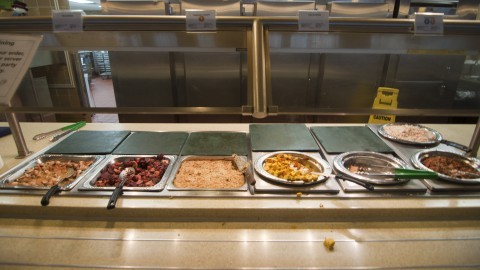I love eating meat. This is evident when listing my favorite foods: grilled chicken with Spanish romesco sauce, lamb chops with freshly cut parsley and thyme or a teriyaki salmon burger. Something about a rich, juicy, well-cooked piece of meat makes my heart skip a beat.
Some of the closest people in my life, however, are vehemently against my love of meat: they tell me that slaughtering animals is unethical and that eating them contributes to climate change. Whenever this issue is brought up, it leads to hours of nasty fights.
Many scientists seem to agree with my friends, also advocating for a vegetarian diet due to environmental and health reasons. Rearing livestock, they point out, accounts for 14 percent of all emissions, and adopting a fully vegetarian diet would cut these emissions by a whopping 63 percent. Moreover, given the increased risk of heart disease, cancer, diabetes and premature death associated with consuming high amounts of red meat, a vegetarian diet certainly has its health benefits.
Switching to a vegetarian diet therefore clearly has its advantages, and for some, it is a healthy, sustainable option. I applaud anyone who decides to pursue this path. At the same time, there are reasons why not everyone should force vegetarianism upon themselves: firstly, it can be financially taxing to pursue such a diet.
For many people in our country, switching to a vegetarian diet is simply not economically feasible. As research from the Harvard School of Public Health notes, a healthy diet consisting of fresh vegetables, nuts and fish is significantly more expensive than a more unhealthy one full of processed foods, meats and refined grains. Because a strictly vegetarian requires purchasing expensive, fresh items, it is difficult for many low-income individuals to adopt this diet without encountering monetary strain. Moreover, for those living in food deserts, fresh vegetables are not available at all: these are areas where the nearest grocery store is a mile away in cities or ten miles away in a rural regions, and where 20 percent of the population is below the poverty line. In urban areas, due to poor public transportation or adverse weather conditions, even going that extra mile can be extremely difficult. Rather than get their foods from grocery stores, consumers are forced to rely on local gas stations and liquor shops, where food is often unhealthy and unvaried. It is clearly unfair to expect poor individuals to feel forced to pursue an expensive and inaccessible diet. Other more reasonable and feasible options should be open to exploration.
Even for people who could afford to go vegetarian, it is tough to embrace such a novel diet, which is why 84 percent of would-be vegetarians abandon the diet in less than a year. Clearly, pushing oneself to such an extreme length is not worth it, as is indicated by the fact that only 37 percent of ex-vegetarians and vegans express a desire to go back to a non-meat diet. Rather than doing something unattainable, people should try to pursue a more moderate path which can be maintained over the long run.
That is why I promote being a sustainable omnivore. Eating meat should still be acceptable, but one should severely reduce their consumption of red meats and consume more lean poultry and fish instead; switching out beef with chicken, for instance, will cut dietary emissions in half. In addition, veggies should be consumed in large quantities. Not only do these steps help reduce one’s carbon footprint, but they also have huge health benefits as lean poultry contains far less fat and calories than other types of meats, and eating more veggies means more key nutrients like potassium and fiber in your system, which are great for your heart.
Of course, the issue of animal cruelty still remains. While I agree that the meat industry’s treatment of animals is brutal, I believe that the financial and psychological hurdles in giving up meat entirely make it impossible to completely halt animal slaughter. We can still minimize the suffering of these animals, nevertheless, by purchasing products with certifications proving the most ethical treatment of the animals involved possible. For example, one can purchase more animal rights-friendly meat products with labels stating phrases like “cage-free” or certified humane.
Like anyone else, I too desire to be healthier and more environmentally friendly. Nevertheless, I want to pursue this in a way that is not idealistic, but rather pragmatic. Sure, if you are motivated or wealthy enough, go ahead with the vegetarian lifestyle and help the world in your unique way. But for the rest of us, the fight for a healthier and more environmentally-conscious lifestyle occasionally involves enjoying a juicy chicken sandwich.
Arnav Mehra is a Collegian columnist and can be reached at [email protected]



















Ollie • Mar 10, 2020 at 1:48 pm
You’re pulling at straws. Amherst, Massachusetts is not a food desert and there are many food subscriptions like the Umass GardenShare that exist to make this diet less expensive than a meat-based diet. Some people who love meat decide to stop eating it because our dying Earth and the lifelong torture of animals are bigger concerns to them than a “rich, juicy, well-cooked piece of meat.” You could have been more honest about your reasons by ending this article after the first line: “I love eating meat.”
ea • Nov 2, 2022 at 10:44 pm
omg ikr